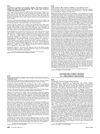Association of Psoriasis and Psoriatic Arthritis with Human Leukocyte Antigen and Killer Cell Immunoglobulin-Like Receptor Gene Frequency: A Multiethnic Population Study
February 2009
in “
Journal of The American Academy of Dermatology
”

TLDR Certain immune system genes are linked to a higher risk of psoriasis and psoriatic arthritis, while others may offer protection.
The study aimed to investigate the association between human leukocyte antigen (HLA) classes I and II and killer cell immunoglobulin-like receptor (KIR) genes with psoriasis vulgaris and psoriatic arthritis. Fifty-five patients with psoriasis vulgaris were evaluated and compared with 134 bone marrow donors as controls. The results showed that HLA-B*57 was present in 23.6% of patients and 7.5% of controls, and HLA-Cw*06 in 29.1% of patients and 16.4% of controls, indicating these alleles as risk factors for psoriasis. HLA-B*57 and HLA-Cw*18 were significantly associated with patients with arthritis. HLA-B*57 was also significantly present in patients with a history of erythroderma, hospital admission, and systemic treatment. The haplotype HLA-A*02 B*57 Cw*06 DQB1*03 DRB1*07 was the most common among patients. KIR2DL2 was found in 53.0% of controls and 29.1% of patients, suggesting a protective role. This study concluded that HLA-B*57 and HLA-Cw*06 are risk factors for psoriasis and psoriatic arthritis, while KIR2DL2 may offer protection. This was the first time HLA-Cw*18 and KIR2DL2 were associated with psoriasis. The study was supported by government funds from FAPERJ and Capes.






